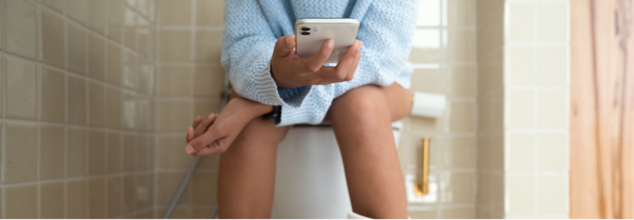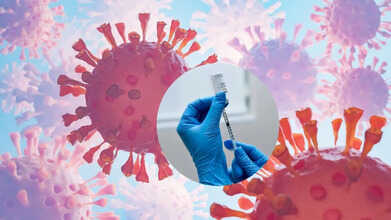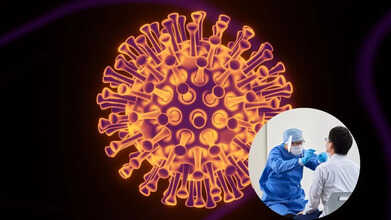- Health Conditions A-Z
- Health & Wellness
- Nutrition
- Fitness
- Health News
- Ayurveda
- Videos
- Medicine A-Z
- Parenting
- Web Stories
3 Compelling Reasons Why You Must Not Use Your Phone While Pooping

3 Compelling Reasons Why You Must Not Use Your Phone While Pooping
Oh, don’t pretend you don’t do it. Most of us are guilty of scrolling through social media, catching up on messages, or even answering emails while sitting on the toilet. After all, what else is there to do while you’re waiting? But hold the phone—literally. Bringing your smartphone into the bathroom might be a common habit, but it could be doing more harm than good.
According to Dr Saurabh Sethi, a gastroenterologist trained at Stanford and Harvard, took to social media platform TikTok to share why using your phone in the bathroom can have serious, often overlooked, health consequences.
Are there any dangers of Prolonged Toilet Time?
In a video posted to TikTok, Dr Sethi warned about the dangers of scrolling on the toilet, noting that sitting for extended periods can have adverse effects on your health, particularly on your rectum and anus. This is because using your phone tends to keep you seated for much longer than necessary, leading to potential problems in your lower digestive region.
“First, using your phone while doing number two can lead to prolonged sitting on the toilet, which can cause strain and pressure on your rectum and anus,” explains Dr Sethi. This excessive strain has been shown to increase the risk of various health conditions, such as hemorrhoids, anal fissures, and even rectal prolapse.
Hemorrhoids are one of the most common issues associated with long periods of sitting on the toilet. These swollen veins or blood vessels around the anus can be painful and are often the result of too much pressure from straining or sitting. According to Johns Hopkins Medicine, they affect millions and can be a real source of discomfort, causing pain, itching, and in some cases, bleeding.
Another problem is anal fissures, which are cracks or tears in the lining of the anal canal. These can develop due to the same excessive straining that leads to hemorrhoids. Cleveland Clinic reports that anal fissures can be incredibly painful and may require medical treatment if they don’t heal on their own. More concerning is the risk of rectal prolapse, a condition in which the rectum sags or protrudes from the anus due to weakened pelvic muscles. This condition is less common but more serious, sometimes requiring a surgical procedure to correct. According to Penn Medicine, rectal prolapse is often associated with chronic straining or prolonged time spent on the toilet.
Third reason and most compelling is that when we use mobile phones while pooping we are unable to defecate fully i.e. defecation is said to happens in three phases- the first major dump which amounts to 60% occurs during the initial few minutes of sitting is the undigested food, the next 30% reportedly occurs when the body pushes out digested waste further and the last 10% is the final defecation.
But when we start using our phones by the second stroke, our brain loses the focus from the defecation to the phone and so the 20-30% remaining waste sits in. And it is only after you shower and breakfast that you begin to get the urge to visit the washroom once!
Not Just Your Body Phones Can Be a Bacterial Playground too
Aside from the physical strain, there’s another uninviting downside to bringing your phone into the bathroom: bacteria. According to Dr. Sethi, “it can be a breeding ground for bacteria.” Studies have shown that the average smartphone is actually dirtier than a public toilet seat. Given that bathroom surfaces are exposed to various types of bacteria, including E. coli and other pathogens, handling your phone there can make it a hotbed for germs. Every time you scroll, tap, or swipe in the bathroom, you could be transferring bacteria to your phone—and potentially to your hands, face, and even food later on.
Even if you don’t directly notice it, bringing your phone into the bathroom and neglecting to sanitize it afterward can lead to increased exposure to harmful bacteria. Dr. Sethi recommends cleaning your phone with a disinfectant wipe if you can’t resist the urge to use it in the bathroom. This simple habit can help reduce bacterial contamination and lower your risk of illness.
Why Sitting and Scrolling videos is Harmful?
While experts don’t yet have definitive studies specifically linking phone use on the toilet to hemorrhoids or other digestive issues, they agree that prolonged sitting itself is a risk factor. Experts explain that the problem isn’t necessarily the phone, but rather the extended amount of time people end up spending on the toilet because of it. Engrossed in a social media feed or a news article, we tend to linger far longer than the necessary few minutes required for a bowel movement. Over time, this habit of prolonged sitting can lead to hemorrhoid issues.
The pressure caused by extended sitting can cause the veins in the rectum to engorge with blood, leading to swelling, discomfort, and even bleeding in severe cases. If a bowel movement doesn’t happen within a few minutes, experts suggest that it’s best to get up, walk around, and return only when the urge arises again.
Dr Sethi and other health experts suggest that spending anywhere from 1 to 15 minutes on the toilet should suffice. Anything beyond that might be an indication of constipation or simply a sign that you’re spending too much time there. Setting a timer may help if you’re someone who tends to lose track of time with your phone in hand. The goal is to avoid sitting, straining, and scrolling unnecessarily.
So the next time you head to the bathroom, consider leaving your phone behind. Reducing the temptation to scroll may save you from discomfort and even potential medical issues in the long run.
Can You Get Your Covid And Flu Shots At The Same Time? Experts Explain

Credits: Canva
Flu season has arrived, and while the summer wave of COVID-19 has subsided, a winter increase is expected. Vaccines are available for both viruses, prompting many to ask about timing, especially if they haven’t received their shots yet. With the CDC updating guidelines, rules around vaccination are constantly evolving, so the most common question is: can you get your COVID and flu shots at the same time?
Can You Get Your Covid And Flu Shots At The Same Time?
The COVID-19 vaccine can be administered alongside a seasonal flu shot for those who prefer to get both at once. It is considered completely safe. “There are no recommendations against it; it mainly comes down to personal preference,” Dr. Mike Ren, an assistant professor of family and community medicine at the Baylor College of Medicine explained. He added that some people may experience mild fatigue with vaccines, and getting multiple shots at the same time could slightly increase that effect.
Many people are already familiar with how their bodies react to flu and COVID-19 vaccines. The COVID shot can sometimes cause soreness in the arm, so it’s recommended to avoid getting both vaccines in the same arm if that happens. For those who experience minimal side effects, there’s no disadvantage to receiving both shots at the same visit. Some choose to space them out simply based on convenience.
Which Covid Shot To Get?
For individuals who have experienced strong reactions to the Pfizer or Moderna mRNA COVID vaccines, the Novavax shot, which uses a more traditional protein-based method may offer an alternative with fewer temporary side effects, according to Caitlin Rivers, an infectious-disease epidemiologist and senior scholar at the Johns Hopkins Center for Health Security.
Males aged 12 to 29 may particularly consider Novavax, as it carries no known risk of myocarditis, a rare heart inflammation sometimes associated with mRNA vaccines. Andrew Pavia, a pediatrics infectious-disease physician at the University of Utah, noted that myocarditis cases linked to mRNA vaccines are generally mild, and COVID-19 itself poses a higher risk of heart complications.
Pavia also explained that there are no major differences between the current Moderna and Pfizer vaccines, so people can choose whichever is more convenient or available.
When Should You Get A Flu Vaccine?
The ideal time to get a flu vaccine is generally from late September through October. Dr. William Schaffner, an infectious disease expert at Vanderbilt University Medical Center, recommends aiming to be vaccinated before Halloween, in line with CDC guidance.
While many pharmacies begin offering flu shots as early as July or August, Dr. Peter Chin-Hong, an infectious disease specialist at the University of California, San Francisco, advises waiting a bit longer. This is because vaccine protection can wane after a few months, and flu cases often peak between December and February.
Even if you miss the early window, it’s still worthwhile to get vaccinated. “Some protection is better than none,” Dr. Chin-Hong emphasizes.
Staying up to date with both COVID-19 and flu vaccinations is an important step in protecting your health during the respiratory virus season. Getting the shots at the same time is safe and convenient for most people, though minor side effects like fatigue or soreness may be slightly increased.
New Covid ‘Frankenstein’ Variant Might Be Behind Your Tooth Pain; NHS Warns of New Symptom

Credits: Canva
Nearly five years after the COVID-19 pandemic began, new variants of the virus are spreading again, bringing with them some unusual symptoms. The main strains currently circulating are called Stratus and Nimbus. According to the NHS, Stratus, which includes the XFG and XFG.3 variants, has caused a 60 percent rise in Covid hospitalisations.
As cases increase worldwide, one woman who recently tested positive described this infection as the “worst it’s ever been.” With more people falling sick, the NHS continues to update its warnings and guidance.
Could That Toothache Be ‘Frankenstein’ Variant?
A woman from the US, Nev, shared on TikTok that she began feeling slightly unwell on August 30, with mild congestion and one blocked nostril. The next day, she noticed a scratchy throat and continued congestion, but later that night, her symptoms worsened as she experienced pain in her teeth, jaw, and head. Her post quickly drew comments from others who said they had also suffered similar symptoms while infected with Covid.
The Stratus strain has been linked to a sudden hoarse voice, while the Nimbus strain often causes severe throat pain described by some as feeling like “swallowing razor blades.” Health officials in the UK have warned that Covid is still leading to serious illness and deaths and have urged people to stay alert to new and unusual symptoms.
Frankenstein Variant Symptoms
The “Frankenstein” variant, officially known as Stratus (XFG), is a recombinant form of the Omicron strain of COVID-19. Its symptoms often resemble those of a seasonal cold or flu. While most infections are mild, some patients have reported unusual signs such as sudden hoarseness or a raspy voice.
Common symptoms include:
- Fever
- Sore throat
- Cough
- Runny or blocked nose
- Fatigue and body aches
- Headache
- Digestive issues
Are Frankenstein And Stratus Variant Same?
The Frankenstein variant and the Stratus variant refer to the same strain of COVID-19, officially known as XFG. The nickname “Frankenstein” emerged because the variant is a recombinant of multiple Omicron sublineages, essentially a genetic mix that combines traits from different versions of the virus. The scientific name Stratus (XFG) is the formal term used by health authorities such as the UKHSA.
According to the UK Health Security Agency (UKHSA), anyone showing symptoms of a respiratory infection such as COVID-19, especially if they have a fever or feel too unwell to continue daily activities should try to stay home and avoid contact with vulnerable people.
If staying home isn’t possible, the agency advises taking extra precautions to reduce the risk of spreading infection. This includes wearing a well-fitted mask with multiple layers or a surgical mask, avoiding crowded or poorly ventilated spaces, and opting for outdoor exercise where there is minimal contact with others. People are also urged to cover their mouth and nose when coughing or sneezing, wash their hands often with soap and water or use sanitizer, and avoid touching their face.
The simplest way to confirm if you have COVID-19 is by taking a test, which can be purchased at most pharmacies.
Even After 50, This One Step Can Lower Your Dementia Risk, Doctors Say

Credits: Canva
Researchers from University College London (UCL) have found that quitting smoking may help slow age-related memory decline and protect brain health as we age. According to new research, people who quit smoking in middle age can significantly slow their cognitive decline, so much so that within a decade, their risk of developing dementia becomes nearly identical to those who have never smoked. The study adds to growing evidence that giving up cigarettes can protect brain health and delay age-related mental decline.
This One Step Can Lower Your Dementia Risk, Doctors Say
Published in The Lancet Healthy Longevity, the study examined data from more than 9,400 adults aged 40 and older across 12 countries. The findings strengthen existing evidence that giving up cigarettes could reduce the risk of dementia, though experts note that further research is needed to understand the full impact of smoking cessation on cognitive health.
Researchers noted that while the link between smoking and poor cognitive health is well known, the long-term effects of quitting have been less certain. In this study, memory and verbal fluency tests showed that people who stopped smoking experienced a slower rate of decline in the six years following cessation.
Experts said the findings are especially important because middle-aged and older adults are often less inclined to quit, despite facing greater health risks. Demonstrating that quitting can also help preserve brain function, they added, could serve as a strong new reason for this group to give up smoking.
Data shows that smoking is most common among adults aged 25 to 34, with about 14 percent identifying as smokers, while only 8.2 percent of those over 65 reported smoking. Responding to the UCL study, Dr. Julia Dudley, head of research at Alzheimer’s Research UK, said smoking is tied to several major health risks, including cancer, heart disease, and dementia—particularly Alzheimer’s and vascular dementia. She emphasized that quitting can greatly lower the likelihood of developing these conditions.
What Is Dementia?
Dementia is an umbrella term for a group of symptoms that affect a person's ability to think, remember, and reason to the point that it interferes with daily life. It is not a normal part of aging, but is caused by damage to brain cells, which can result from conditions like Alzheimer's disease, vascular dementia, or Lewy body dementias. Symptoms include memory loss, confusion, difficulty with language and problem-solving, and changes in mood or behavior, and the condition worsens over time.
What Causes Dementia?
Dementia develops when diseases damage brain cells, disrupting how they communicate with one another. This breakdown in communication affects memory, thinking, behavior, and emotions. The brain is made up of different regions, each responsible for specific functions such as judgment, movement, and memory. When cells in a certain area are harmed, that part of the brain can no longer perform normally.
Each type of dementia is linked to damage in particular brain regions. In Alzheimer’s disease, for instance, an abnormal buildup of proteins inside and around brain cells prevents them from staying healthy and transmitting signals effectively. The hippocampus, responsible for learning and memory, is usually the first area affected, which is why memory loss tends to be one of the earliest signs of Alzheimer’s.
© 2024 Bennett, Coleman & Company Limited

